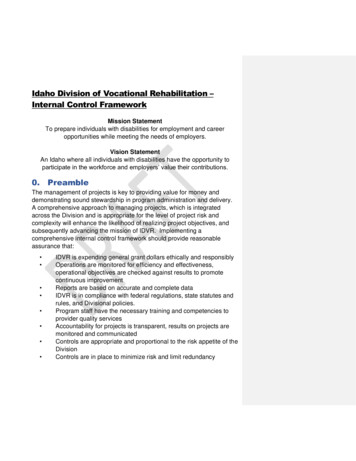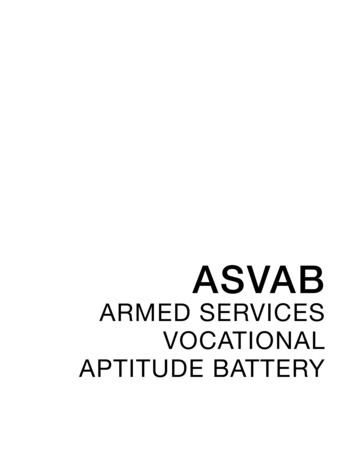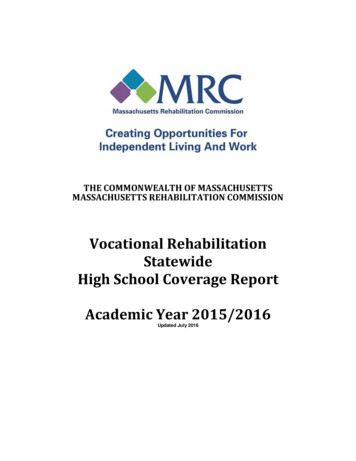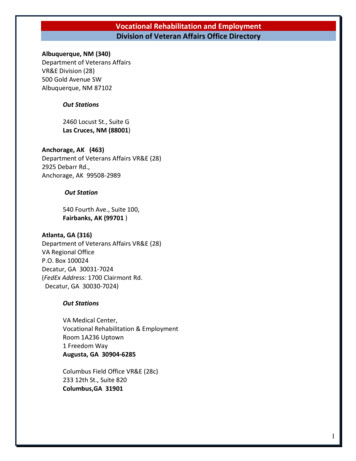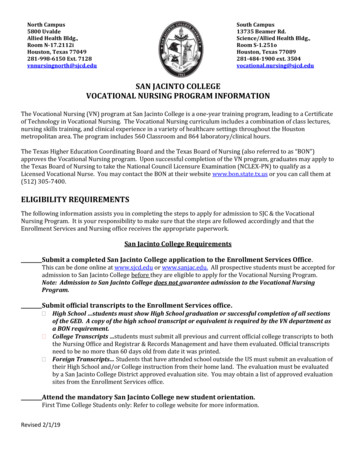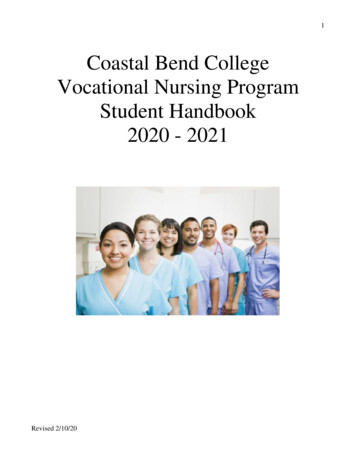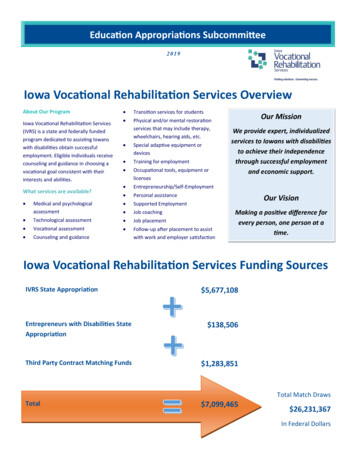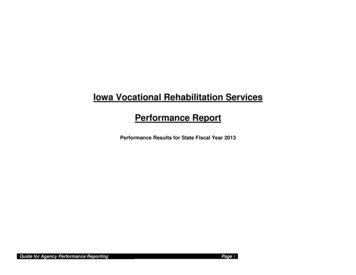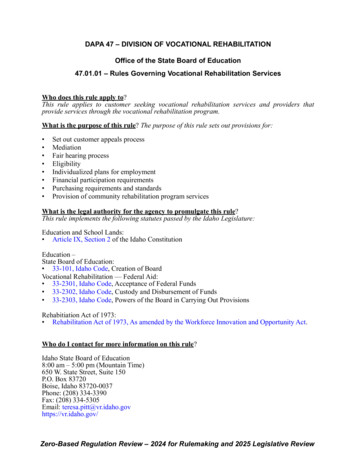
Transcription
DAPA 47 – DIVISION OF VOCATIONAL REHABILITATIONOffice of the State Board of Education47.01.01 – Rules Governing Vocational Rehabilitation ServicesWho does this rule apply to?This rule applies to customer seeking vocational rehabilitation services and providers thatprovide services through the vocational rehabilitation program.What is the purpose of this rule? The purpose of this rule sets out provisions for: Set out customer appeals processMediationFair hearing processEligibilityIndividualized plans for employmentFinancial participation requirementsPurchasing requirements and standardsProvision of community rehabilitation program servicesWhat is the legal authority for the agency to promulgate this rule?This rule implements the following statutes passed by the Idaho Legislature:Education and School Lands: Article IX, Section 2 of the Idaho ConstitutionEducation –State Board of Education: 33-101, Idaho Code, Creation of BoardVocational Rehabilitation — Federal Aid: 33-2301, Idaho Code, Acceptance of Federal Funds 33-2302, Idaho Code, Custody and Disbursement of Funds 33-2303, Idaho Code, Powers of the Board in Carrying Out ProvisionsRehabitiation Act of 1973: Rehabilitation Act of 1973, As amended by the Workforce Innovation and Opportunity Act.Who do I contact for more information on this rule?Idaho State Board of Education8:00 am – 5:00 pm (Mountain Time)650 W. State Street, Suite 150P.O. Box 83720Boise, Idaho 83720-0037Phone: (208) 334-3390Fax: (208) 334-5305Email: Based Regulation Review – 2024 for Rulemaking and 2025 Legislative Review
Tab l e o f C o n t e n t sIDAPA 47 – DIVISION OF VOCATIONAL REHABILITATION47.01.01 – Rules Governing Vocational Rehabilitation Services000. Legal Authority. . 3001. Title And Scope. . 3002. Administrative Appeals. . 3003. Confidential Records. . 3004. – 009. (Reserved) . 3010. Definitions. . 3011. Abbreviations. . 3012. – 099. (Reserved) . 3100. Customer Appeals. . 4101. Informal Review Process. . 4102. Mediation. . 4103. Fair Hearing Process. . 5104. – 199. (Reserved) . 5200. Provision Of Services On A Statewide Basis. . 5201. Referral And Application For Services. . 6202. Eligibility Requirements. . 6203. Presumptive Eligibility. . 6204. Trial Work Experience. . 6205. Severity Of Disability. . 6206. Comprehensive Assessment Of Rehabilitation Needs. . 7207. Individualized Plan For Employment (IPE). . 7208. Case Closure. . 8209. Order Of Selection. . 8210. – 299. (Reserved) . 8300. Financial Participation Requirements. . 8301. Comparable Benefits. . 9302. – 399. (Reserved) . 9400. Purchasing Requirements. . 9401. Purchasing Standards. . 9402. Provision Of Community Rehabilitation Program (CRP) Services. . 10403. – 999. (Reserved) . 10Page 2
IDAHO ADMINISTRATIVE CODEDivision of Vocational RehabilitationIDAPA 47.01.01 – Rules GoverningVocational Rehabilitation ServicesIDAPA 47 – DIVISION OF VOCATIONAL REHABILITATION47.01.01 – RULES GOVERNING VOCATIONAL REHABILITATION SERVICES000.LEGAL AUTHORITY.Article IX, Section 2 of the Idaho Constitution, Section 33-2303, Idaho Code and the Rehabilitation Act of 1973, asamended by the Workforce Innovation and Opportunity Act (WIOA).(6-10-20)T001.TITLE AND SCOPE.01.Services.”Title. The title of this chapter is IDAPA 47.01.01, “Rules Governing Vocational Rehabilitation(6-10-20)T02.Scope. The provision of these rules is to establish the program requirements and to implementprogram changes necessitated by the Rehabilitation Act of 1973, as amended by WIOA.(6-10-20)T002.ADMINISTRATIVE APPEALS.Administrative appeals are governed by Section 100 of these rules in accordance with 34 CFR 361.57.(6-10-20)T003.CONFIDENTIAL RECORDS.All personal information concerning the Division’s customers is confidential. The information is used only forpurposes directly connected to the administration of Vocational Rehabilitation services, and may not be releasedwithout the informed, written consent of the customer, except as otherwise provided by law.(6-10-20)T004. – 009.010.DEFINITIONS.01.Authorization for Purchase. A purchase order issued on behalf of the Division.02.Customer. Any individual who has applied for or is eligible for vocational rehabilitation services.(6-10-20)T03.Division. The Idaho Division of Vocational 10-20)T(6-10-20)TState Administrator. The Chief Executive Officer of the Idaho Division of Vocational(6-10-20)TABBREVIATIONS.01.AFP. Authorization for Purchase.(6-10-20)T02.CAP. Client Assistance Program.(6-10-20)T03.CFR. Code of Federal Regulations.(6-10-20)T04.IPE. Individualized Plan for Employment.(6-10-20)T05.VRC. Vocational Rehabilitation Counselor.(6-10-20)T06.WIOA. Workforce Innovation and Opportunity Act.(6-10-20)T012. – 099.Section 000(RESERVED)Page 3
IDAHO ADMINISTRATIVE CODEDivision of Vocational RehabilitationIDAPA 47.01.01 – Rules GoverningVocational Rehabilitation Services100.CUSTOMER APPEALS.In accordance with 34 CFR 361.57, the customer appeals process is governed by Sections 101-103 of these rules.(6-10-20)T101.INFORMAL REVIEW PROCESS.An informal review process is an option available to the customer as a method to resolve disagreements ordissatisfaction with the provision of services. An individual may request an informal review. The request must be inwriting to the regional manager, describe the complaint, and be made within twenty-one (21) calendar days of theagency notice regarding the provision or denial of services that are in question. The regional manager will function asthe administrative review officer in the informal review process. At the customer’s request another regional managermay be substituted. The reviewer will be responsible for:(6-10-20)T01.Advising the Customer. Advising the customer of their right to have a representative present andencouraging the customer to use the services of the Client Assistance Program (CAP).(6-10-20)T02.Conducting the Review. Conducting the review within twenty-one (21) calendar days followingreceipt of a written request for such a review, unless both parties agree upon an extension.(6-10-20)T03.Documented Effort. Extending the time allowed for conducting an information reviewaccordingly, when the customer makes a documented effort to utilize CAP or another advocate to resolve thedissatisfaction.(6-10-20)T04.Review Location. Holding the review at a time and place convenient to the customer, generally atthe local Division branch office.(6-10-20)T05.Communication Method. Provide communication using appropriate methods for those customerswho have a sensory impairment. Providing an interpreter for those customers who cannot communicate in English.(6-10-20)T06.Transportation. Provide transportation to and from the review site, if needed.(6-10-20)T07.Informal Review Decision. The regional manager will provide a written decision after conductingthe informal review. The customer may request mediation or fair hearing within twenty-one (21) calendar days of theinformal review written decision.(6-10-20)T102.MEDIATION.Mediation is an alternate dispute resolution method available to applicants and eligible customers who have initiatedthe formal appeals process.(6-10-20)T01.Timeline. A customer may request mediation. The request must be made within twenty-one (21)calendar days of the original decision or twenty-one (21) calendar days following the written decision from theinformal review. Mediation is available to a customer when an informal review has not resolved the dispute to thesatisfaction of the customer.(6-10-20)T02.Written Request. Requests for mediation must be made in writing to the field services chief andclearly state the reason for dissatisfaction with the decision or results of the informal review. The field services chiefwill represent the Division or assign a member of the administrative or supervisory staff who has not participated inthe agency action that created the customer’s dissatisfaction.(6-10-20)T03.Participation. Participation in the mediation process is voluntary on the part of the customer andon the part of the Division. Either party may reject mediation as an alternate dispute resolution method. Oncemediation has been accepted as an alternate dispute resolution method, either party may terminate the mediationprocess.(6-10-20)T04.Right to Fair Hearing. Mediation may not be used to deny or delay the customer’s right to pursuea fair hearing. Should the customer and/or designated representative select mediation in lieu of a fair hearing, theSection 100Page 4
IDAHO ADMINISTRATIVE CODEDivision of Vocational RehabilitationIDAPA 47.01.01 – Rules GoverningVocational Rehabilitation Servicesoption for a fair hearing will be extended to allow the results of the mediation to be established. Once the final resultsof the mediation are determined, the customer retains the right to request a fair hearing.(6-10-20)T05.Mediator. All mediation is conducted by a qualified and impartial mediator who is selectedrandomly from a list of mediators maintained by the Division.(6-10-20)T06.Confidentiality. Mediation discussions are confidential and may not be used as evidence in a fairhearing. Both parties at the beginning of the mediation process will sign a confidentiality agreement.(6-10-20)T07.Mediation Agreement. The mediator will develop a written mediation agreement if an agreementbetween the parties is reached. The agreement must be signed by the customer, the mediator, and the Divisiondesignated representative.(6-10-20)T08.Cost. Cost of mediation is paid by the Division. The Division does not pay for any cost related tothe representation of a customer.(6-10-20)T103.FAIR HEARING PROCESS.The fair hearing process is an option available to any customer who is dissatisfied with any determination made bypersonnel of the Division that affects the provision of vocational rehabilitation services. A customer may request afair hearing immediately without having to go through any other appeal steps. A customer may request, or ifappropriate may request through the customer’s representative, a timely review of the determination. Such requestmust be made within twenty-one (21) calendar days of the Division’s decision resulting in the initial disagreement orwithin twenty-one (21) calendar days of the conclusion of the informal review or mediation process, whichever islater. The fair hearing process will be conducted by a fair hearing officer.(6-10-20)T01.Procedure. A fair hearing is a procedure whereby a customer who is dissatisfied with anydetermination concerning the provision or denial of Division services or the findings of the informal review ormediation may seek a determination of agency action before a fair hearing officer.(6-10-20)T02.Written Request. Requests for a fair hearing must be sent in writing to the field services chief andclearly state the customer’s dissatisfaction with the agency’s decision.(6-10-20)T03.Timeline. The hearing will be conducted within sixty (60) calendar days of receipt of theindividual’s request for review, unless informal resolution is achieved prior to the 60th day, or both parties agree to aspecific extension of time.(6-10-20)T04.Fair Hearing Officers. The Administrator of the Division and the State Rehabilitation Councilwill identify a list of fair hearing officers jointly. The Administrator and the customer will select the fair hearingofficer from the list.(6-10-20)T05.Written Report. The fair hearing officer will issue a written report of the findings and decision ofthe hearing within thirty (30) calendar days of the completion of the hearing.(6-10-20)T06.Decision. The decision of the fair hearing officer will be considered final by the Division.(6-10-20)T07.Dispute. Any party who disagrees with the findings and decisions of a fair hearing officer will havethe right to bring a civil action with respect to the matter in dispute. The action may be brought in any state court ofcompetent jurisdiction or in a district court of the United States of competent jurisdiction without regard to theamount in controversy.(6-10-20)T104. – 199.(RESERVED)200.PROVISION OF SERVICES ON A STATEWIDE BASIS.Vocational Rehabilitation services are offered on a statewide basis to individuals with disabilities, subject toeligibility determination.(6-10-20)TSection 103Page 5
IDAHO ADMINISTRATIVE CODEDivision of Vocational Rehabilitation201.IDAPA 47.01.01 – Rules GoverningVocational Rehabilitation ServicesREFERRAL AND APPLICATION FOR SERVICES.01.Referral. An agency, organization, individual (including self) or programs of the American JobCenter Network may refer an individual for services. The Division will make a minimum of three (3) attempts torespond to the individual before closing the referral.(6-10-20)T02.Application for Services. The application process includes the following; an individual must signand date an application, or make a request for alternate application, provide necessary information to begin anassessment of eligibility, information gathered in the intake interview meets this criterion, and the customer isavailable and free of restrictions to complete the assessment process for determining eligibility for Division services.(6-10-20)Ta.Residency Requirement. There is no duration of residency to apply for Division services.Individuals must be living in the state of Idaho and legally able to work in the United States (i.e., non-U.S. citizensmust show they are legally able to work within the United States).(6-10-20)Tb.Other Requirements. Customers must be available to participate in the eligibility determinationprocess and will be informed of their rights and responsibilities as a customer of the program.(6-10-20)T202.ELIGIBILITY REQUIREMENTS.Eligibility for vocational rehabilitation services provided by the Division is based upon the following criteria:(6-10-20)T01.Professional Documentation of Impairment. The customer has a physical or mental impairmentdocumented by a qualified professional;(6-10-20)T02.Impediment Determined by Counselor. The customer’s physical or mental impairmentconstitutes a substantial impediment to employment as determined by a qualified Vocational RehabilitationCounselor (VRC);(6-10-20)T03.Determination of Services for Employment. A determination by a qualified VRC employed bythe Division that the customer requires vocational rehabilitation services to prepare for, secure, retain, advance in, orregain employment consistent with the applicant’s unique strengths, resources, priorities, concerns, abilities,capabilities, interests, and informed choice. A qualified VRC is an individual who meets the Division’sComprehensive System of Personnel Development policy.(6-10-20)T203.PRESUMPTIVE ELIGIBILITY.Individuals eligible for Social Security benefits under Title II or Title XVI of the Social Security Act, based upontheir disability, are presumed to meet the eligibility requirements for vocational rehabilitation services, unless theVRC questions the individual’s ability to benefit from vocational rehabilitation services because of the severity of theindividual’s disability.(6-10-20)T204.TRIAL WORK EXPERIENCE.In cases where a VRC questions a customer’s ability to benefit from vocational rehabilitation services, due to theseverity of their disability, the VRC must obtain clear and convincing evidence that the individual cannot benefitfrom services, prior to closing the individual’s case. A trial work plan should only include those services which willassess an individual’s ability to work in competitive integrated employment.(6-10-20)T205.SEVERITY OF DISABILITY.At the time a customer is determined eligible for vocational rehabilitation services, a determination of thesignificance of disability, as it relates to employment, will also be determined. A priority category assignment will bedetermined for all eligible individuals, in one (1) of the following categories:(6-10-20)T01.Priority Category 1 - Eligible Individuals with the Most Significant Disabilities (MSD).(6-10-20)Ta.Meets criteria established for a customer with a significant disability; andSection 201Page 6(6-10-20)T
IDAHO ADMINISTRATIVE CODEDivision of Vocational RehabilitationIDAPA 47.01.01 – Rules GoverningVocational Rehabilitation Servicesb.Experiences a severe physical and/or mental impairment that seriously limits three (3) or morefunctional categories (such as mobility, work skills, self-care, interpersonal skills, communication, self-direction orwork tolerance) in terms of an employment outcome; and(6-10-20)Tlonger.c.Requires multiple primary Individualized Plan for Employment (IPE) services for six (6) months or(6-10-20)T02.Priority Category 2 - Eligible Individuals with Significant Disabilities (SD).(6-10-20)Ta.Meets the criteria for a customer with no significant disability; and(6-10-20)Tb.Experiences a severe physical and/or mental impairment that seriously limits two (2) functionalcategories (such as mobility, work skills, self-care, interpersonal skills, communication, self-direction or worktolerance) in terms of an employment outcome; and(6-10-20)Tc.Requires multiple primary IPE services for six (6) months or longer.(6-10-20)T03.Priority Category 3 - All other Eligible Individuals with Disabilities (D).(6-10-20)Ta.Has a physical or mental impairment; and(6-10-20)Tb.Impairment constitutes or results in a substantial impediment to employment; and(6-10-20)Tc.Requires vocation
IDAHO ADMINISTRATIVE CODE IDAPA 47.01.01 – Rules Governing Division of Vocational Rehabilitation Vocational Rehabilitation Services Section 100 Page 4 100. CUSTOMER APPEALS. In accordance with 34 CFR 361.57, the customer appeals process is governed by Sections 101-103

